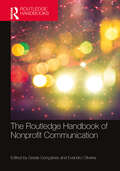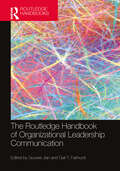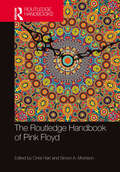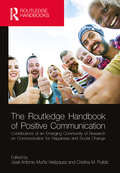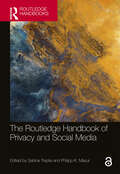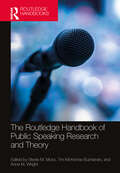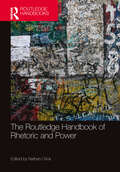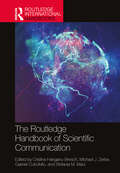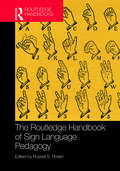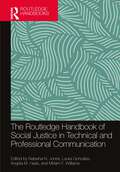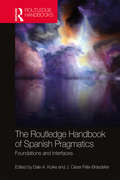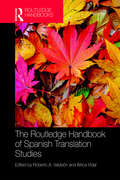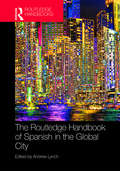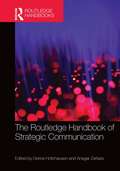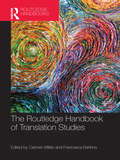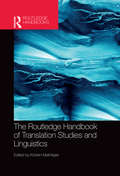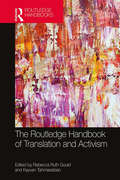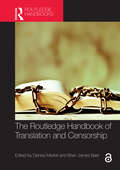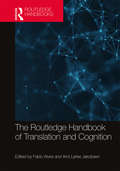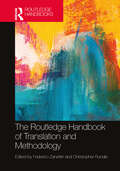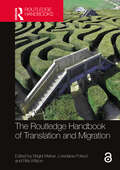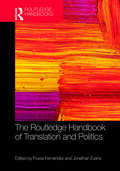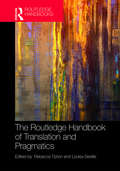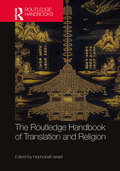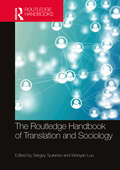- Table View
- List View
The Routledge Handbook of Nonprofit Communication (Routledge Handbooks in Communication Studies)
by Evandro Oliveira Gisela GonçalvesThis handbook brings together multidisciplinary and internationally diverse contributors to provide an overview of theory, research, and practice in the nonprofit and nongovernmental organization (NGO) communication field. It is structured in four main parts: the first introduces metatheoretical and multidisciplinary approaches to the nonprofit sector; the second offers distinctive structural approaches to communication and their models of reputation, marketing, and communication management; the third focuses on nonprofit organizations’ strategic communications, strategies, and discourses; and the fourth assembles campaigns and case studies of different areas of practice, causes, and geographies. The handbook is essential reading for scholars, educators, and advanced students in nonprofit and NGO communication within public relations and strategic communication, organizational communication, sociology, management, economics, marketing, and political science, as well as a useful reference for leaders and communication professionals in the nonprofit sector.
The Routledge Handbook of Organizational Leadership Communication (Routledge Handbooks in Communication Studies)
by Gail T. Fairhurst Guowei JianThis handbook captures a rapidly developing body of scholarship to map out the terrain of leadership communication and stimulate interdisciplinary dialogue among leadership communication scholars for future research. The Routledge Handbook of Organizational Leadership Communication surveys various areas of leadership communication, critically assesses their development, and proposes guidance for future research. It begins by addressing prominent theories or emerging theoretical perspectives that help conceptualize leadership communication, ranging from collective leadership approaches and critical perspectives to theories of practice and communicative constitution of organization. The second section focuses on reviewing the latest research on leadership communication in various organizational contexts, such as work teams, hybrid and virtual work contexts, and interorganizational collaboration. Informed by diverse theoretical perspectives, chapters in the final section examine the practice of leadership communication in dealing with both common and novel organizing challenges and processes, for example, the formation and execution of organizational vision and strategies, the use of emerging media technologies, and organizational decision making.The handbook will be an indispensable resource for researchers and advanced students in leadership communication and leadership studies and practicing managers and consultants in leadership and communication training and development.
The Routledge Handbook of Pink Floyd (Routledge Music Handbooks)
by Chris Hart Simon A. MorrisonThe Routledge Handbook of Pink Floyd is intended for scholars and researchers of popular music, as well as music industry professionals and fans of the band. It brings together international researchers to assess, evaluate and reformulate approaches to the critical study and interpretation of one of the world’s most important and successful bands. For the first time, this Handbook will ‘tear down the wall,’ examining the band’s collective artistic creations and the influence of social, technological, commercial and political environments over several decades on their work. Divided into five parts, the book provides a thoroughly contextualised overview of the musical works of Pink Floyd, including coverage of performance and sound; media, reception and fandom; genre; periods of Pink Floyd’s work; and aesthetics and subjectivity. Drawing on art, design, performance, culture and counterculture, emergent theoretical resources and analytical frames are evaluated and discussed from across the social sciences, humanities and creative arts. The Handbook is intended for scholars and researchers of popular music, as well as music industry professionals. It will appeal across a range of related subjects from music production to cultural studies and media/communication studies.
The Routledge Handbook of Positive Communication: Contributions of an Emerging Community of Research on Communication for Happiness and Social Change (Routledge Handbooks in Communication Studies)
by José Antonio Muñiz Velázquez Cristina M. PulidoThe Routledge Handbook of Positive Communication forms a comprehensive reference point for cross-disciplinary approaches to understanding the central role of communication in the construction of hedonic and eudemonic happiness,or subjective and psychological well-being. Including contributions from internationally recognized authors in their respective fields, this reference uses as its focus five main scenarios where communication affects the life of individuals: mass and digital media, advertising and marketing communication, external and internal communication in companies and organizations, communication in education, and communication in daily life interactions.
The Routledge Handbook of Privacy and Social Media (Routledge Handbooks in Communication Studies)
by Sabine Trepte Philipp K. MasurThis volume provides the basis for contemporary privacy and social media research and informs global as well as local initiatives to address issues related to social media privacy through research, policymaking, and education. Renowned scholars in the fields of communication, psychology, philosophy, informatics, and law look back on the last decade of privacy research and project how the topic will develop in the next decade. The text begins with an overview of key scholarship in online privacy, expands to focus on influential factors shaping privacy perceptions and behaviors – such as culture, gender, and trust – and continues with specific examinations of concerns around vulnerable populations such as children and older adults. It then looks at how privacy is managed and the implications of interacting with artificial intelligence, concluding by discussing feasible solutions to some of the more pressing questions surrounding online privacy. This handbook will be a valuable resource for advanced students, scholars, and policymakers in the fields of communication studies, digital media studies, psychology, and computer science. Chapter 22 and Chapter 30 of this book are freely available as downloadable Open Access PDFs at http://www.taylorfrancis.com under a Creative Commons Attribution-Non Commercial-No Derivatives (CC-BY-NC-ND) 4.0 license.
The Routledge Handbook of Public Speaking Research and Theory (Routledge Handbooks in Communication Studies)
by Stevie M. Munz, Tim McKenna-Buchanan, and Anna M. WrightProviding a comprehensive survey of the empirical research, theory, and history of public speaking, this handbook fills a crucial gap in public speaking pedagogy resources and provides a foundation for future research and pedagogical development.Bringing together contributions from both up-and-coming and senior scholars in the field, this book offers a thorough examination of public speaking, guided by research across six key themes: the history of public speaking; the foundations of public speaking; issues of diversity, equity, and inclusion; considerations of public speaking across contexts; assessment of public speaking; and the future of public speaking in the twenty-first century. The evidence-based chapters engage with a broad discussion of public speaking through a variety of viewpoints to demonstrate how subtopics are connected and fraught with complexity. Contributors explore public speaking in education, business and professional settings, and political contexts, and outline how skills learned through public speaking are applicable to interpersonal, small group, and business interactions.Reinforcing the relevance, importance, and significance of public speaking in individual, interpersonal, social, and cultural communication contexts, this accessibly written handbook will be an indispensable resource for public speaking instructors and program administrators. It will also be valuable reading for Communication Pedagogy and Introduction to Graduate Studies courses.
The Routledge Handbook of Rhetoric and Power (Routledge Handbooks in Communication Studies)
by Nathan CrickThis handbook represents the first comprehensive disciplinary investigation into the relationship between rhetoric and power as it is expressed in different aspects of society.Providing conceptual and empirical foundations for the study of the relationship between different forms of rhetorical expression and diverse structures, practices, habits, and networks of power, The Routledge Handbook of Rhetoric and Power is divided into six parts: Theoretical Foundations Propaganda, Politics, and the State Resistance and Social Movements Culture, Society, and Identity Discourses of Technique and Organization Prospects for the Future The guiding principle of this handbook is that power represents a capacity for coordinated action grounded in specific historical, technological, political, and economic conditions. It suggests that rhetoric is an art that adapts to these conditions and finds ways to transform, create, or undermine these capacities in other people through self-conscious persuasion. Featuring contributions from key scholars, this accessibly written handbook will be an indispensable resource for researchers and students in the fields of rhetoric, writing studies, communication studies, political communication, and social justice.
The Routledge Handbook of Scientific Communication (Routledge Environment and Sustainability Handbooks)
by Gabriel Cutrufello Cristina Hanganu-Bresch Michael J. Zerbe Stefania M. MaciGiven current science-related crises facing the world such as climate change, the targeting and manipulation of DNA, GMO foods, and vaccine denial, the way in which we communicate science matters is vital for current and future generations of scientists and publics. The Routledge Handbook of Scientific Communication scrutinizes what we value, prioritize, and grapple with in science as highlighted by the rhetorical choices of scientists, students, educators, science gatekeepers, and lay commentators. Drawing on contributions from leading thinkers in the field, this volume explores some of the most pressing questions in this growing field of study, including: How do issues such as ethics, gender, race, shifts in the publishing landscape, and English as the lingua franca of science influence scientific communication practices? How have scientific genres evolved and adapted to current research and societal needs? How have scientific visuals developed in response to technological advances and communication needs? How is scientific communication taught to a variety of audiences? Offering a critical look at the complex relationships that characterize current scientific communication practices in academia, industry, government, and elsewhere, this Handbook will be essential reading for students, scholars, and professionals involved in the study, practice, and teaching of scientific, medical, and technical communication.
The Routledge Handbook of Sign Language Pedagogy (Routledge Language Handbooks)
by Russell S. RosenThe Routledge Handbook of Sign Language Pedagogy is the first reference of its kind, presenting contributions from leading experts in the field of sign language pedagogy. The Handbook fills a significant gap in the growing field of sign language pedagogy, compiling all essential aspects of current trends and empirical research in teaching, curricular design, and assessment in one volume. Each chapter includes historical perspectives, core issues, research approaches, key findings, pedagogical implications, future research direction, and additional references. The Routledge Handbook of Sign Language Pedagogy is an essential reference for sign language teachers, practitioners, and researchers in applied sign linguistics and first, second, and additional language learning.
The Routledge Handbook of Social Justice in Technical and Professional Communication (Routledge Handbooks in Communication Studies)
by Laura Gonzales Miriam F. Williams Natasha N. Jones Angela M. HaasThis handbook interrogates and illustrates contemporary approaches to technical and professional communication (TPC) by focusing on emerging issues in the field. Using a social justice-centered approach, the handbook provides a view of the current state of the discipline and highlights emerging directions and perspectives that will influence the trajectory of the field in the coming years. It is divided into five interrelated parts: Disciplinarity Pedagogy Practice Social Change Intersections: Cultures and Communities Acknowledging that TPC is always embedded and participating in specific power structures, The Routledge Handbook of Social Justice in Technical and Professional Communication offers readers a way forward, a future imagined and re-imagined, and presents scholarship that is progress-in-process for TPC. Providing frameworks and strategies for embracing a social justice-driven approach, this handbook will be of interest to scholars, teachers, administrators, community leaders, and workplace and industry practitioners in the field of TPC.
The Routledge Handbook of Spanish Pragmatics: Foundations and Interfaces (Routledge Spanish Language Handbooks)
by J. César Félix-Brasdefer Dale A. KoikeThe Routledge Handbook of Spanish Pragmatics is the first volume to offer a comprehensive overview of advances in Spanish Pragmatics, addressing different types of interaction and the variables, both social and linguistic, that can affect them. Written by a diverse set of experts in the field, the handbook unifies two major approaches to the study of pragmatics, the Anglo-American and European Continental traditions. Thirty-three chapters cover in detail both pragmatic foundations (e.g. speech act theory, implicature and relevance, deixis) and interfaces with other concepts, including: • Discourse • Variation; Culture and interculture • (Im)politeness; humor • Learning contexts and teaching • Technology This is an ideal reference for advanced undergraduate and postgraduate students, and researchers of Spanish language and linguistics.
The Routledge Handbook of Spanish Translation Studies (Routledge Spanish Language Handbooks)
by Roberto A. Valdeón África VidalWritten by leading experts in the area, The Routledge Handbook of Spanish Translation Studies brings together original contributions representing a culmination of the extensive research to-date within the field of Spanish Translation Studies. The Handbook covers a variety of translation related issues, both theoretical and practical, providing an overview of the field and establishing directions for future research. It starts by looking at the history of translation in Spain, the Americas during the colonial period and Latin America, and then moves on to discuss well-established areas of research such as literary translation and audiovisual translation, at which Spanish researchers have excelled. It also provides state-of-the-art information on new topics such as the interface between translation and humour on the one hand, and the translation of comics on the other. This Handbook is an indispensable resource for postgraduate students and researchers of translation studies.
The Routledge Handbook of Spanish in the Global City (Routledge Spanish Language Handbooks)
by Andrew LynchThe Routledge Handbook of Spanish in the Global City brings together contributions from an international team of scholars of language in society to offer a conceptual and empirical perspective on Spanish within the context of 15 major cosmopolitan cities from around the world. With a unique focus on Spanish as an international language, each chapter questions the traditional and modern notions of language, place, and identity in the urban context of globalization. This collection of new perspectives on the sociology of Spanish provides an insightful and invaluable resource for students and researchers seeking to explore lesser-known areas of sociolinguistic research.
The Routledge Handbook of Strategic Communication (Routledge Handbooks in Communication Studies)
by Ansgar Zerfass Derina HoltzhausenThe Routledge Handbook of Strategic Communication provides a comprehensive review of research in the strategic communication domain and offers educators and graduate-level students a compilation of approaches to and studies of varying aspects of the field. The volume provides insights into ongoing discussions that build an emerging body of knowledge. Focusing on the metatheoretical, philosophical, and applied aspects of strategic communication, the parts of the volume cover: • Conceptual foundations, • Institutional and organizational dimensions, • Implementing strategic communication, and • Domains of practice An international set of authors contributes to this volume, illustrating the broad arena in which this work is taking place. A timely volume surveying the current state of scholarship, this Handbook is essential reading for scholars in strategic communication at all levels of experience.
The Routledge Handbook of Translation Studies (Routledge Handbooks in Applied Linguistics)
by Carmen Millán Francesca BartrinaThe Routledge Handbook of Translation Studies provides a comprehensive, state-of-the-art account of the complex field of translation studies. Written by leading specialists from around the world, this volume brings together authoritative original articles on pressing issues including: the current status of the field and its interdisciplinary nature the problematic definition of the object of study the various theoretical frameworks the research methodologies available. The handbook also includes discussion of the most recent theoretical, descriptive and applied research, as well as glimpses of future directions within the field and an extensive up-to-date bibliography. The Routledge Handbook of Translation Studies is an indispensable resource for postgraduate students of translation studies.
The Routledge Handbook of Translation Studies and Linguistics (Routledge Handbooks in Translation and Interpreting Studies)
by Kirsten MalmkjærThe Routledge Handbook of Translation Studies and Linguistics explores the interrelationships between translation studies and linguistics in six sections of state-of-the-art chapters, written by leading specialists from around the world. The first part begins by addressing the relationships between translation studies and linguistics as major topics of study in themselves before focusing, in individual chapters, on the relationships between translation on the one hand and semantics, semiotics and the sound system of language on the other. Part II explores the nature of meaning and the ways in which meaning can be shared in text pairs that are related to each other as first-written texts and their translations, while Part III focuses on the relationships between translation and interpreting and the written and spoken word. Part IV considers the users of language and situations involving more than one language and Part V addresses technological tools that can assist language users. Finally, Part VI presents chapters on the links between areas of applied linguistics and translation and interpreting. With an introduction by the editor and an extensive bibliography, this handbook is an indispensable resource for advanced students of translation studies, interpreting studies and applied linguistics.
The Routledge Handbook of Translation and Activism (Routledge Handbooks in Translation and Interpreting Studies)
by Rebecca Ruth GouldThe Routledge Handbook of Translation and Activism provides an accessible, diverse and ground-breaking overview of literary, cultural, and political translation across a range of activist contexts. As the first extended collection to offer perspectives on translation and activism from a global perspective, this handbook includes case studies and histories of oppressed and marginalised people from over twenty different languages. The contributions will make visible the role of translation in promoting and enabling social change, in promoting equality, in fighting discrimination, in supporting human rights, and in challenging autocracy and injustice across the Middle East, Africa, Latin America, East Asia, the US and Europe. With a substantial introduction, thirty-one chapters, and an extensive bibliography, this Handbook is an indispensable resource for all activists, translators, students and researchers of translation and activism within translation and interpreting studies.
The Routledge Handbook of Translation and Censorship (Routledge Handbooks in Translation and Interpreting Studies)
by Brian James Baer Denise MerkleThe Routledge Handbook of Translation and Censorship is the first handbook to provide a comprehensive overview of the topic, offering broad geographic and historical coverage, and extending the political contexts to incorporate colonial and postcolonial viewpoints, as well as pluralistic societies. It examines key cultural texts of all kinds as well as audio-visual translation, comics, drama and videogames.With over 30 chapters, the Handbook highlights commonalities and differences across the various contexts, encouraging comparative approaches to the topic of translation and censorship. Edited and authored by leading figures in the field of Translation Studies, the chapters provide a critical mapping of the current research and suggest future directions.With an introductory chapter by the editors on theorizing censorship, the Handbook is an essential reference and resource for advanced students, scholars and researchers in translation studies, comparative literature and related fields.Chapter 30 of this book is freely available as a downloadable Open Access PDF at http://www.taylorfrancis.com under a Creative Commons Attribution-Non Commercial-No Derivatives (CC BY-NC-ND) 4.0 license.
The Routledge Handbook of Translation and Cognition (Routledge Handbooks in Translation and Interpreting Studies)
by Fabio AlvesThe Routledge Handbook of Translation and Cognition provides a comprehensive, state-of-the-art overview of how translation and cognition relate to each other, discussing the most important issues in the fledgling sub-discipline of Cognitive Translation Studies (CTS), from foundational to applied aspects. With a strong focus on interdisciplinarity, the handbook surveys concepts and methods in neighbouring disciplines that are concerned with cognition and how they relate to translational activity from a cognitive perspective. Looking at different types of cognitive processes, this volume also ventures into emergent areas such as neuroscience, artificial intelligence, cognitive ergonomics and human–computer interaction. With an editors’ introduction and 30 chapters authored by leading scholars in the field of Cognitive Translation Studies, this handbook is the essential reference and resource for students and researchers of translation and cognition and will also be of interest to those working in bilingualism, second-language acquisition and related areas.
The Routledge Handbook of Translation and Methodology (Routledge Handbooks in Translation and Interpreting Studies)
by Federico ZanettinThe Routledge Handbook of Translation and Methodology provides a comprehensive overview of methodologies in translation studies, including both well-established and more recent approaches. The Handbook is organised into three sections, the first of which covers methodological issues in the two main paradigms to have emerged from within translation studies, namely skopos theory and descriptive translation studies. The second section covers multidisciplinary perspectives in research methodology and considers their application in translation research. The third section deals with practical and pragmatic methodological issues. Each chapter provides a summary of relevant research, a literature overview, critical issues and topics, recommendations for best practice, and some suggestions for further reading. Bringing together over 30 eminent international scholars from a wide range of disciplinary and geographical backgrounds, this Handbook is essential reading for all students and scholars involved in translation methodology and research.
The Routledge Handbook of Translation and Migration (Routledge Handbooks in Translation and Interpreting Studies)
by Rita Wilson Brigid Maher Loredana PolezziThe Routledge Handbook of Translation and Migration explores the practices and attitudes surrounding migration and translation, aiming to redefine these two terms in light of their intersections and connections. The volume adopts an interdisciplinary and transnational perspective, highlighting the broad scope of migration and translation as not only linguistic and geographical phenomena, but also cultural, social, artistic, and psychological processes.The nexus between migration and translation, the central concern of this Handbook, challenges limited conceptualisations of identity and belonging, thereby also exposing the limitations of monolingual, monocultural models of nationhood. Through a diverse range of approaches and methodologies, individual chapters investigate specific historical circumstances and illustrate the need for an intersectional approach to questions of language access and language mediation.With its range of approaches and case studies, the volume highlights the inherently political nature of translation and its potential to shape social and cultural inclusion, emphasising the crucial role of language and translation in informing professional practices, institutional policies, educational approaches and community attitudes towards migration. By bringing together perspectives from both researchers and creative practitioners, this book makes an innovative contribution to ongoing global discussions on linguistic hospitality and diversity, ideal for those pursing postgraduate and doctoral studies in translation studies, linguistics, international studies and cultural studies.
The Routledge Handbook of Translation and Politics (Routledge Handbooks in Translation and Interpreting Studies)
by Jonathan Evans Fruela FernandezThe Routledge Handbook of Translation and Politics presents the first comprehensive, state of the art overview of the multiple ways in which ‘politics’ and ‘translation’ interact. Divided into four sections with thirty-three chapters written by a roster of international scholars, this handbook covers the translation of political ideas, the effects of political structures on translation and interpreting, the politics of translation and an array of case studies that range from the Classical Mediterranean to contemporary China. Considering established topics such as censorship, gender, translation under fascism, translators and interpreters at war, as well as emerging topics such as translation and development, the politics of localization, translation and interpreting in democratic movements, and the politics of translating popular music, the handbook offers a global and interdisciplinary introduction to the intersections between translation and interpreting studies and politics. With a substantial introduction and extensive bibliographies, this handbook is an indispensable resource for students and researchers of translation theory, politics and related areas.
The Routledge Handbook of Translation and Pragmatics (Routledge Handbooks in Translation and Interpreting Studies)
by Rebecca Tipton Louisa DesillaThe Routledge Handbook of Translation and Pragmatics provides an overview of key concepts and theory in pragmatics, charts developments in the disciplinary relationship between translation studies and pragmatics, and showcases applications of pragmatics-inspired research in a wide range of translation, spoken and signed language interpreting activities. Bringing together 22 authoritative chapters by leading scholars, this reference work is divided into three sections: Influences and Intersections, Methodological Issues, and Applications. Contributions focus on features of linguistic pragmatics and their analysis in authentic and experimental data relating to a wide range of translation and interpreting activities, including: news, scientific, literary and audiovisual translation, translation in online social media, healthcare interpreting and audio description for the theatre. It also encompasses contributions on issues beyond the level of the text that include the study of interpersonal relationships in practitioner networks and the development of pragmatic competence in interpreter training. Each chapter includes many practical illustrative examples and a list of recommended reading. Fundamental reading for students and academics in translation and interpreting studies, this is also an essential resource for those working in the related fields of linguistics, communication and intercultural studies.
The Routledge Handbook of Translation and Religion (Routledge Handbooks in Translation and Interpreting Studies)
by Hephzibah IsraelThe Routledge Handbook of Translation and Religion is the first to bring together an extensive interdisciplinary engagement with the multiple ways in which the concepts and practices of translation and religion intersect. The book engages a number of scholarly disciplines in conversation with each other, including the study of translation and interpreting, religion, philosophy, anthropology, history, art history, and area studies. A range of leading international specialists critically engage with changing understandings of the key categories ‘translation’ and ‘religion’ as discursive constructs, thus contributing to the development of a new field of academic study, translation and religion. The twenty-eight contributions, divided into six parts, analyze how translation constructs ideas, texts or objects as 'sacred' or for ‘religious purposes’, often in competition with what is categorized as ‘non-religious.’ The part played by faith communities is treated as integral to analyses of the role of translation in religion. It investigates how or why translation functions in re-constructing and transforming religion(s) and for whom and examines a range of ‘sacred texts’ in translation—from the written to the spoken, manuscript to print, paper to digital, architectural form to objects of sacred art, intersemiotic scriptural texts, and where commentary, exegesis and translation interweave. This Handbook is an indispensable scholarly resource for researchers in translation studies and the study of religions.
The Routledge Handbook of Translation and Sociology (Routledge Handbooks in Translation and Interpreting Studies)
by Sergey Tyulenev Wenyan LuoThe Routledge Handbook of Translation and Sociology is the first encyclopedic presentation of research into the social aspects of translation and interpreting. It consists of 35 chapters contributed by 40 experts in their respective fields of the sociology of translation. The Handbook traces the evolution of research into social aspects of translation and interpreting, explains the basics of the sociology of translation, offers an insight into studies of translation within sociology, and shows the place translation and interpreting occupies among social functional systems and its interactions with social forces and practices.With global coverage spanning all inhabited continents, the Handbook examines translational practices across diverse cultures and historical periods, from ancient origins to modern professional practices. Suitable for both undergraduate and postgraduate students of translation and interpreting, as well as researchers in the sociology of translation, the Handbook furnishes readers with a comprehensive understanding of the field. It offers a thorough exploration of the current state of the sociology of translation and suggests avenues for further research.
